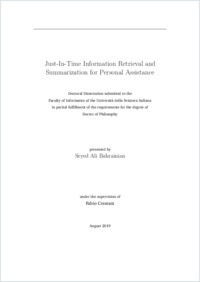Just-in-time information retrieval and summarization for personal assistance
- Bahrainian, Seyed Ali
- Crestani, Fabio (Degree supervisor)
-
18.06.2019
182 p
Thèse de doctorat: Università della Svizzera italiana, 2019
Summarization
Just-in-time information retrieval
Personal assistance
Abstractive summarization
Lifelogging
Proactive IR
English
With the rapid development of means for producing user-generated data opportunities for collecting such data over a time-line and utilizing it for various human-aid applications are more than ever. Wearable and mobile data capture devices as well as many online data channels such as search engines are all examples of means of user data collection. Such user data could be utilized to model user behavior, identify relevant information to a user and retrieve it in a timely fashion for personal assistance. User data can include recordings of one's conversations, images, biophysical data, health-related data captured by wearable devices, interactions with smartphones and computers, and more. In order to utilize such data for personal assistance, summaries of previously recorded events can be presented to a user in order to augment the user's memory, send notifications about important events to the user, predict the user's near-future information needs and retrieve relevant content even before the user asks. In this PhD dissertation, we design a personal assistant with a focus on two main aspects: The first aspect is that a personal assistant should be able to summarize user data and present it to a user. To achieve this goal, we build a Social Interactions Log Analysis System (SILAS) that summarizes a person's conversations into event snippets consisting of spoken topics paired with images and other modalities of data captured by the person's wearable devices. Furthermore, we design a novel discrete Dynamic Topic Model (dDTM) capable of tracking the evolution of the intermittent spoken topics over time. Additionally, we present the first neural Customizable Abstractive Topic-based Summarization (CATS) model that produces summaries of textual documents including meeting transcripts in the form of natural language. The second aspect that a personal assistant should be capable of, is proactively addressing the user's information needs. For this purpose, we propose a family of just-in-time information retrieval models such as an evolutionary model named Kalman combination of Recency and Establishment (K2RE) that can anticipate a user's near-future information needs. Such information needs can include information for preparing a future meeting or near-future search queries of a user.
- Language
-
- English
- Classification
- Computer science and technology
- License
-
License undefined
- Identifiers
-
- RERO DOC 327768
- URN urn:nbn:ch:rero-006-118822
- ARK ark:/12658/srd1319241
- Persistent URL
- https://n2t.net/ark:/12658/srd1319241
Statistics
Document views: 400
File downloads:
- Texte intégral: 377
